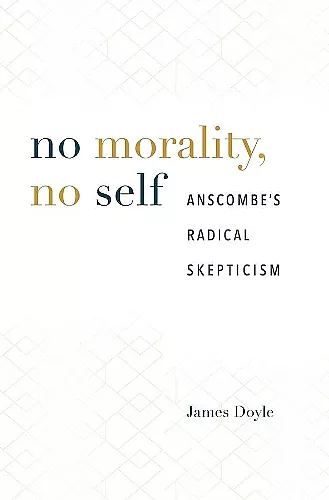No Morality, No Self
Anscombe’s Radical Skepticism
Format:Hardback
Publisher:Harvard University Press
Published:27th Apr '18
Currently unavailable, and unfortunately no date known when it will be back

Frequently cited and just as often disputed, Elizabeth Anscombe’s “Modern Moral Philosophy” (1958) and “The First Person” (1975) are touchstones of twentieth-century analytic philosophy. Though the arguments Anscombe advances in these papers are familiar to philosophers, their significance remains widely misunderstood, says James Doyle.
No Morality, No Self offers a fresh interpretation of Anscombe’s still-controversial theses about ethical reasoning and individual identity, specifically, her argument that the term “moral” (as it occurs in such contexts as “moral obligation”) is literally meaningless, and that “I” does not refer to some special entity called a “self”—a pair of claims that philosophers have responded to with deep skepticism. However unsettling Anscombe’s conclusions may be, Doyle shows the underlying seriousness of the British philosopher’s reasoning, exposing with clarity and concision how the counterarguments of Anscombe’s detractors are based on a flawed or incomplete understanding of her ideas.
Doyle zeroes in on the central conundrum Anscombe posed to the referentialist school: namely, that it is impossible to give a noncircular explanation of how “I” refers to the person who utters it. He shows where the refutations of philosophers including Lucy O’Brien, Gareth Evans, and Ian Rumfitt fall short, and throws light on why “I” developed features that make it look as if it functions as a referring expression. Reconciling seemingly incompatible points of view, Doyle argues that “I” does refer to a self, but not in a way anyone suspected—a surprising conclusion that is entirely à propos of Anscombe’s provocative thought.
Timely and significant…[A] meticulous examination of Anscombe’s work. -- Constantine Sandis * Times Literary Supplement *
No Morality, No Self: Anscombe’s Radical Skepticism is an absolutely remarkable achievement. James Doyle shows that, when properly understood, Elizabeth Anscombe presents a major challenge to contemporary moral philosophy. This book will bring Anscombe’s thought to the forefront of ethical theory. -- Sergio Tenenbaum, University of Toronto
James Doyle brings out how radical and philosophically significant are Elizabeth Anscombe’s ideas, in his discussions of two of Anscombe’s best-known theses: that the term ‘moral’ as it occurs in such contexts as ‘moral obligation’ is a word of merely mesmeric force, and that ‘I’ is not an expression that refers to something. Critics of these two theses must now think carefully and take stock in light of Doyle’s arguments. This book is a major contribution to Anscombe studies. -- Roger Teichmann, University of Oxford
ISBN: 9780674976504
Dimensions: unknown
Weight: unknown
256 pages